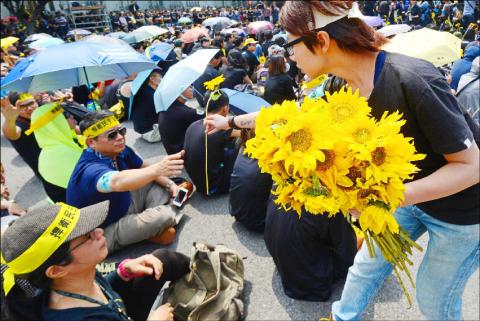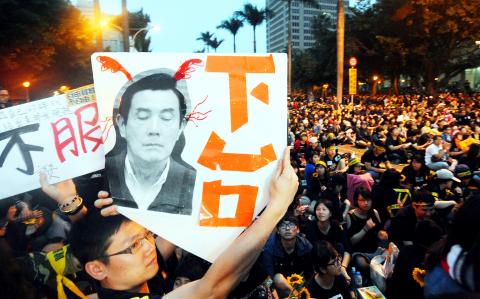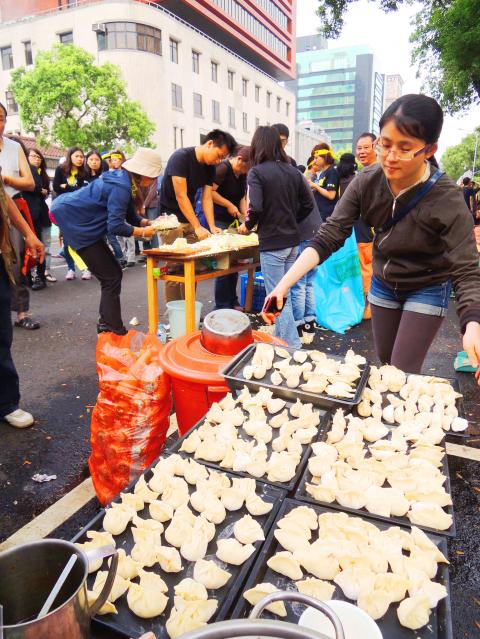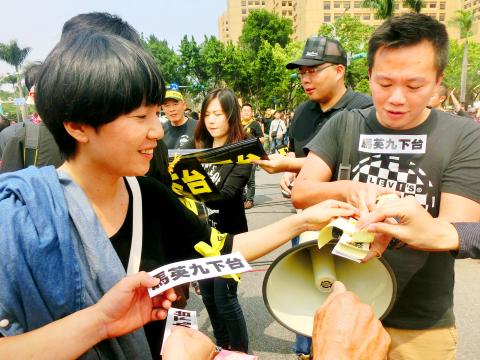From all walks of life, supporters of the “Sunflower student movement” took to the street in Taipei yesterday, marked by festivity, diversity and order.
An hour before the scheduled start of the event at 1pm, the “black-clad army” — dress code for the protest against the government’s handling of the controversial cross-strait service trade pact — emerged from nearby MRT stations and packed the designated protest site in front of the Presidential Office Building on Ketagalan Boulevard.
“I am here to support these students. I’m here out of guilt because people of my generation have done too little. We owe these kids a better Taiwan,” said Chiu Shih-lung (邱仕龍), who is in his 70s.

Photo: Sam Yeh, AFP
Chiu, who came from Greater Kaohsiung, said he supported the students’ cause of safeguarding Taiwan’s democracy and demanding the withdrawal of the cross-strait service pact because “it endangers national security and sovereignty.”
“We must safeguard our island’s interests,” said Chin Mei Ching, a 29-year-old mother who was pushing her one-year-old daughter in a buggy. “We have to guard against China using the economy to control us.”
The majority of the protesters were students and young people.

Photo: Lo Pei-der, Taipei Times
They brought sunflowers, a symbol of the protests, and wore yellow ribbons that read “Fight for democracy, retract the service trade pact.”
Some posed with self-made banners, on which were slogans such as “Condemn state violence” and “I don’t want the service trade pact,” or demanding President Ma Ying-jeou (馬英九) and Premier Jiang Yi-huah (江宜樺) step down.
Alliance of Civil Action Against Ma Ying-jeou spokesperson Shen Chih-lin (沈志霖) stood in the crowd and gave out stickers that read: “Ma Ying-jeou step down” (馬英九下台).

Photo: Chang Wen-chuan, Taipei Times
Shen said he prepared 1,500 of the stickers and distributed them near the Jingfumen (景福門), which directly faces the Presidential Office Building, and 500 of them were taken by eager protesters in the space of one minute.
A man disappointed with Ma’s failed governance suggested Shen print a sticker that read: “Nine percent approval rating, Ma Ying-jeou step down,” adding: “How can Ma govern the nation or gain trust from the people with such a low approval rating?”
Separately, students from Taipei National University of the Arts brought 3,000 sunflower brooches they had made and gave them out to the protesters.

Photo: Lee Hsin-fang, Taipei Times
The students said that about 10 students worked on the brooches from 6pm on Saturday until early yesterday, with NT$30,000 of funds they had raised.
Half of the brooches were given out within 10 minutes, near NTU Hospital MRT Station’s exit No. 1, at 1pm. The students said they kept the rest for distribution at the legislature.
Like their peers at the week-long sit-ins around the legislature compound, besieged by students and other activists and protesters since March 18, university professors made the street their classrooms, holding discussions and having students express their views about the trade deal with China.
A student spoke through a loudspeaker to his classmates from Soochow University, saying that he believed young people “would see a different face of society when they are on the street” and that would be at least as meaningful — if not more meaningful — as studying in the library or doing laboratory research.
Designer Chiang Lin Chia-jen (姜林家真) held a handmade, helmet-shaped umbrella that read: “Don’t hit my head” to protest against the violence the government used against unarmed student protesters at the Executive Yuan on Monday morning.
In front of the Legislative Yuan, a university junior student surnamed Hu (胡) set up a tent with a sunflower painted on it, inviting protesters to help use their fingerprints to color the sunflowers — to symbolize that the student movement is a result of the gathered strength of the people.
Many people lent their fingerprints, and the painting was almost finished by noon.
Hu said she had taken pictures of everyone who left a handprint on it, and that she will upload the photographs and the final painting on a Facebook page, in memory of “the year we stood up for the student movement.”
Yesterday’s protest was aimed at more than just the trade agreement, which was unilaterally passed through its committee without deliberation by Chinese Nationalist Party (KMT) lawmakers on March 17 and sparked the student-led movement, as non-governmental organizations (NGOs), which worked with the students to organize the protest, also took the opportunity to promote their causes.
A total of 22 NGOs, which focused on a wide range of social issues, such as gender, education, culture and environment, set up booths on Zhongshan S Road.
The student movement has received strong support for a reason, Northern Coast Anti-Nuclear Action Alliance chief executive Kuo Ching-lin (郭慶霖) said.
“People support the movement because they understand that Taiwan has a long way to go as a democracy. For years, the government had always made unilateral decisions without consulting the people, such as the construction of nuclear power plants and nuclear waste storage sites,” Kuo said.
“Most people no longer trust the government,” he added.
Politicians have taken a back seat in the protests, with Democratic Progressive Party (DPP) heavyweights choosing to participate in the protest quietly, without drawing too much attention.
Wearing a black shirt, DPP Chairman Su Tseng-chang (蘇貞昌) said he attended the event as a citizen, while former DPP chairperson Tsai Ing-wen (蔡英文) praised the students’ courage and discipline and urged Ma to ease people’s suspicions by making substantial promises.
The DPP Central Committee had instructed its members who plan to take part in year-end elections not to attend the demonstration wearing their campaign vests.
In addition, election flags and campaign vehicles were prohibited at the protest sites.
Additional reporting by Huang Hsin-po and agencies

CHAOS: Iranians took to the streets playing celebratory music after reports of Khamenei’s death on Saturday, while mourners also gathered in Tehran yesterday Iranian Supreme Leader Ayatollah Ali Khamenei was killed in a major attack on Iran launched by Israel and the US, throwing the future of the Islamic republic into doubt and raising the risk of regional instability. Iranian state television and the state-run IRNA news agency announced the 86-year-old’s death early yesterday. US President Donald Trump said it gave Iranians their “greatest chance” to “take back” their country. The announcements came after a joint US and Israeli aerial bombardment that targeted Iranian military and governmental sites. Trump said the “heavy and pinpoint bombing” would continue through the week or as long

TRUST: The KMT said it respected the US’ timing and considerations, and hoped it would continue to honor its commitments to helping Taiwan bolster its defenses and deterrence US President Donald Trump is delaying a multibillion-dollar arms sale to Taiwan to ensure his visit to Beijing is successful, a New York Times report said. The weapons sales package has stalled in the US Department of State, the report said, citing US officials it did not identify. The White House has told agencies not to push forward ahead of Trump’s meeting with Chinese President Xi Jinping (習近平), it said. The two last month held a phone call to discuss trade and geopolitical flashpoints ahead of the summit. Xi raised the Taiwan issue and urged the US to handle arms sales to

State-run CPC Corp, Taiwan (CPC, 台灣中油) yesterday said that it had confirmed on Saturday night with its liquefied natural gas (LNG) and crude oil suppliers that shipments are proceeding as scheduled and that domestic supplies remain unaffected. The CPC yesterday announced the gasoline and diesel prices will rise by NT$0.2 and NT$0.4 per liter, respectively, starting Monday, citing Middle East tensions and blizzards in the eastern United States. CPC also iterated it has been reducing the proportion of crude oil imports from the Middle East and diversifying its supply sources in the past few years in response to geopolitical risks, expanding

Pro-democracy media tycoon Jimmy Lai’s (黎智英) fraud conviction and prison sentence were yesterday overturned by a Hong Kong court, in a surprise legal decision that comes soon after Lai was jailed for 20 years on a separate national security charge. Judges Jeremy Poon (潘兆初), Anthea Pang (彭寶琴) and Derek Pang (彭偉昌) said in the judgement that they allowed the appeal from Lai, and another defendant in the case, to proceed, as a lower court judge had “erred.” “The Court of Appeal gave them leave to appeal against their conviction, allowed their appeals, quashed the convictions and set aside the sentences,” the judges